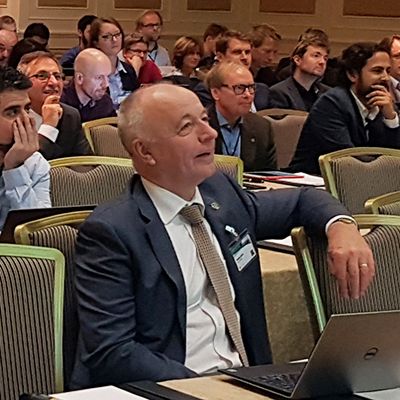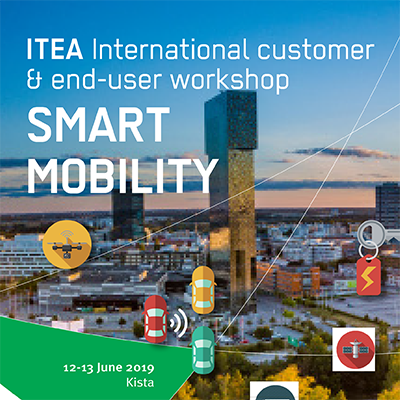IKANGAI
Your partner for mobile customer engagement
Founded in 2009 by Martin Treiber and Christian Scherling, IKANGAI is an independent mobile solutions factory with years of expertise in developing and implementing digital business solutions. With a strong focus on mobile marketing and customer communication, they help customers with their mobile marketing strategy by integrating new efficient digital products and services, like their qonnect® platform, which enables retailers to reach their customers at the right moment with information they need.
Co-founder and current project leader of the ITEA SOLOMON project Martin Treiber shares his story with us. “The idea of starting a business began while we were at school. As thirteen-year-olds we already had the ambition to develop our own business but, at that time, our idea was to create a great experience for people to hang out – a bar or something like that. Fortunately, this didn’t happen. We went off to study – I did computer science and Christian did architecture. Afterwards, Christian went off to Japan to work as an architect and I became a university assistant. But when he returned, we got in touch again and discussed the idea we had talked about at school. In 2007 the iPhone had just hit the market and so we thought about developing mobile software. Putting our designing and computing talents together.”
Good idea
The company’s name derives from the Japanese word ‘IIKANGAE’, which translates as ‘good idea’ – a good idea indeed when “we first started developing software in 2008 for the fun of it, for data exchange, and experimented with a small social media network called Moody.” Word soon spread, and before they knew it commercial enterprises were calling on Martin and Christian to develop mobile solutions for them, mostly apps. Later, realising that their rather small home market of Austria meant there was the risk of running out of customers, Martin and Christian shifted strategy. The time was ripe for the two partners to cast off their daytime jobs and devote their efforts full-time to their new venture. The search began for new investors and there was a key change from project-based work to developing a platform. By 2014 the company had assumed its present shape with expertise ranging from software engineering, web development and graphic design to motion design, mobile marketing and business consulting.

Hurdle-free customer engagement
“Our main product is qonnect®,” Martin explains. This communication platform enables brands and retailers to create new mobile moments on their customers’ journey and to reach these customers at the right moment with information they need. It uses mobile web, native apps, push notifications, geolocation, chatbots, smart speakers and interactive displays to help achieve revenue targets and to simplify mobile engagement. “Although it may seem to be a bit of a contradiction, we removed the registration process and replaced it with freedom of choice. This is actually one of the main qualities of qonnect® - it provides the customer the best possible hurdle-free experience. Through qonnect® customers tell the brand or retailer what they are interested in, thereby providing the means for personalised messages. We can build new customer solutions on the qonnect® platform rather quickly and so keep extending its possibilities.”
IKANGAI is certainly beginning to make a name for itself. Very recently the company was listed among the top App development companies in Austria. “We’re happy and proud that all our hard work is being recognised.”
Crossing paths
IKANGAI is in a business where software innovation is crucial but “as a small company we have to be careful about the new technologies in which we invest. Jumping into new technology always involves risk. But that’s where public funding comes into play. Austria is good from that point of view and we make use of the opportunities they provide and this brought us to ITEA. I was scanning the internet to see what was around and I came across the SOLOMON project, and got in touch.” In May 2017 IKANGAI took charge of this ITEA 3 project. “I suppose you could say that we and ITEA crossed paths somewhat fortuitously,” Martin explains, “and also fortunately.”
SOLOMON
Martin is project leader of this consortium that targets the integration and further development of new technologies for the customer experience of the future. “We want to connect different technologies and information sources into seamless services with scope for interaction between the retailers, shop personnel and consumers.” With E-commerce having drastically transformed the retail industry, SOLOMON aims to improve the customer experience in bricks-and-mortar stores by defining a ‘shop operations and experience’ platform. The platform emphasises the use of mobile devices for rich user experiences with the provision of a flexible and re-configurable software infrastructure. “The Micro Pop-Up Store (MPUS) with Self-Checkout is our showcase scenario,” Martin says. “It combines most of the technologies currently being developed for SOLOMON. We imagine MPUS being positioned in receptions areas of hotels, fitness clubs, events and similar locations with indirect human supervision.”
Endorsement
ITEA Vice-chairman Philippe Letellier calls SOLOMON a “small but very innovative and dedicated project [covering] many sides of this [E-commerce] revolution.” It is inventing many new paths, e.g. to ensure a coherent online/offline experience, customer self-services on mobile devices such as self-payment, digital assistants, and monitoring customer behaviour in the online store. Using modern technologies, an ontology is created to describe all the interactions between the different stakeholders and develop a DSL (Domain Specific Language) to allow the store manager to change the interaction quickly and make easy use of the previous ontology.
“We have gained a lot so far from being involved in this ITEA project – apart from the money being provided by our funding agencies in Austria, we learn about working in an international team and looking beyond our own market. Furthermore, ITEA projects are really focused on impact and fast exploitation. That’s really important for us as well. Our research has to target a potential product so at the end of the project, there have to be tangible results. That’s a clear common goal we share with ITEA. Ideally, it would be great if we could find commercial uptake within the ITEA Community,” Martin concludes, tongue-in-cheek. “That would be the icing on an already very fruitful cake!”
More information
https://www.ikangai.com/Other chapters
Use the arrows to view more chapters

Editorial
By Philippe Letellier

Country focus: Sweden
An innovation force in a sustainable world!

Country focus: Sweden - Saab AB
Commitment to trustworthy software innovation

SoRTS Success story
A system of real-time systems for more effective healthcare

SotA BaaS
Semantic technologies and very traditional industry as Building

Community Talk with Fopke Klok
The Klok is ticking ... on life at ITEA ... and beyond

End user happiness FUSE-IT
Security of Smart Buildings: saving energy and lives!

Metaverse1 Success Story
The missing link between the real and the virtual

Customer workshop Smart Mobility
Help solve the challenges resulting from this ITEA customer workshop

SME spotlight IKANGAI
Your partner for mobile customer engagement

ITEA 3 Call 5 projects
Happiness, openness and trust

